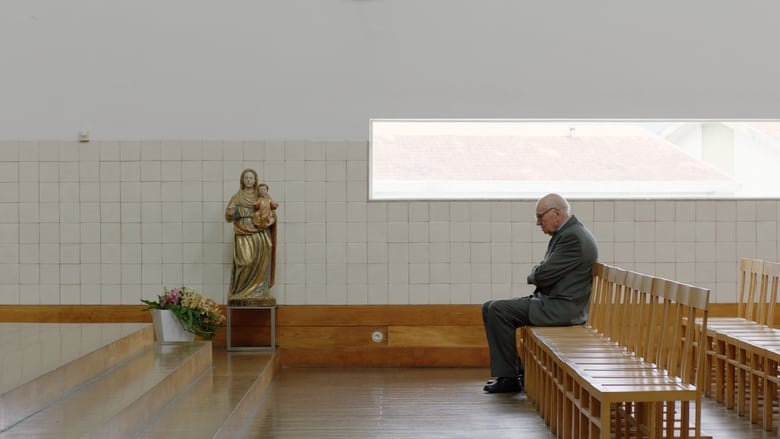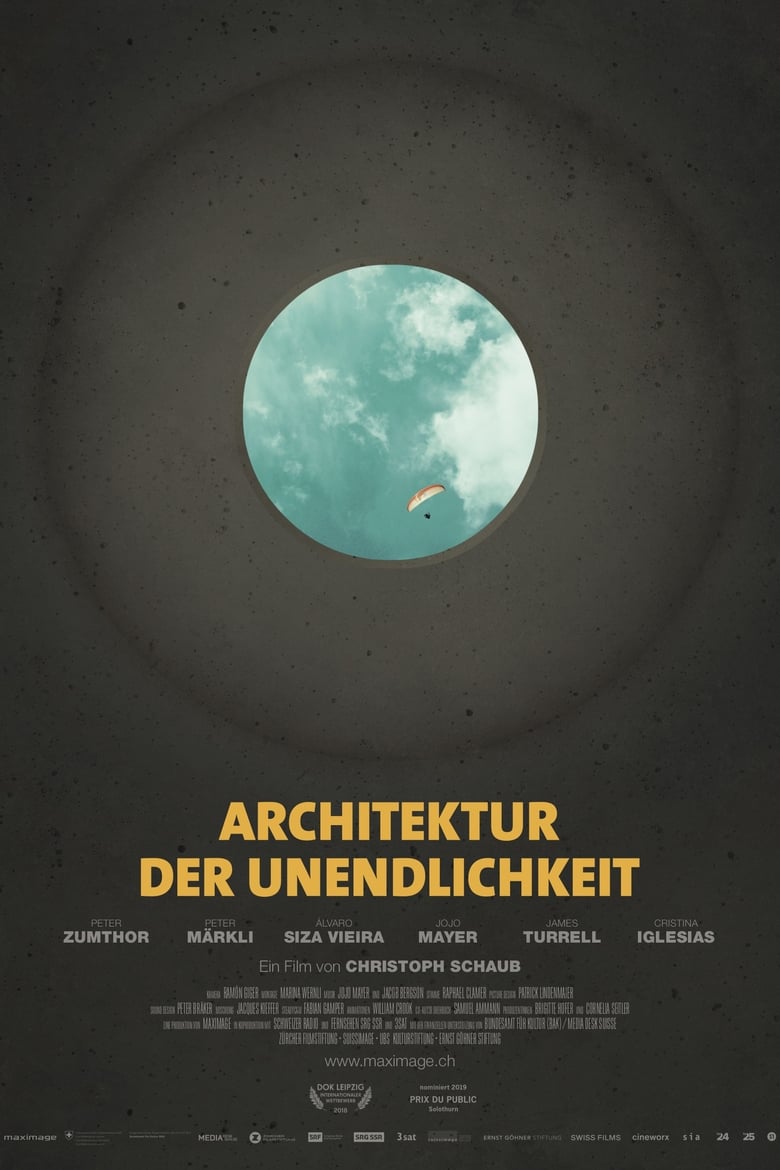

Architecture of Infinity
Genres
Overview
How can structures, which take up defined, rigid portions of space, make us feel transcendence? How can chapels turn into places of introspection? How can walls grant boundless freedom? Driven by intense childhood impressions, director Christoph Schaub visits extraordinary churches, both ancient and futuristic, and discovers works of art that take him up to the skies and all the way down to the bottom of the ocean. With the help of architects Peter Zumthor, Peter Märkli, and Álvaro Siza Vieira, artists James Turrell and Cristina Iglesias, and drummer Sergé “Jojo” Mayer, he tries to make sense of the world and decipher our spiritual experiences using the seemingly abstract concepts of light, time, rhythm, sound, and shape. The superb cinematography turns this contemplative search into a multi-sensory experience.
Details
Budget
$0
Revenue
$0
Runtime
85 min
Release Date
2019-01-31
Status
Released
Original Language
German
Vote Count
5
Vote Average
6
Peter Zumthor
Himself
Cristina Iglesias
Herself
Álvaro Siza Vieira
Himself
James Turrell
Himself
Peter Märkli
Himself
Jojo Mayer
Himself
Raphael Clamer
Narrator
7.8
Crownsville Hospital: From Lunacy to Legacy
Crownsville Hospital: From Lunacy to Legacy is a feature-length documentary film highlighting the history of the Crownsville State Mental Hospital in Crownsville, MD.
2018-10-18 | en
5.5
Eero Saarinen: The Architect Who Saw the Future
Best known for designing National Historic Landmarks such as St. Louis’ iconic Gateway Arch and the General Motors Technical Center, Saarinen also designed New York’s TWA Flight Center at John F. Kennedy International Airport, Yale University’s Ingalls Rink and Morse and Ezra Stiles Colleges, Virginia’s Dulles Airport, and modernist pedestal furniture like the Tulip chair.
2016-12-27 | en
0.0
Into the Island
Into the Island is the first chapter of Groundwork, a three-part film and exhibition series exploring the conceptual development and field research of contemporary architects cultivating alternative modes of engagement with new project sites.
2023-01-01 | zh
7.4
Gaudí, le génie visionnaire de Barcelone
In Barcelona, the Casa Batlló alone sums up the genius of Antoni Gaudí. During the exhibition devoted to it by the Musée d'Orsay, we take a guided tour of this eccentric, colorful residence, completed in 1906.
2022-05-29 | fr
6.5
The Mars Generation
Aspiring teenage astronauts reveal that a journey to Mars is closer than you think.
2017-01-20 | en
7.0
Into Great Silence
An intimate portrayal of the everyday lives of Carthusian monks of the Grande Chartreuse, high in the French Alps (Chartreuse Mountains). The idea for the film was proposed to the monks in 1984, but the Carthusians said they wanted time to think about it. The Carthusians finally contacted Gröning 16 years later to say they were now willing to permit Gröning to shoot the movie, if he was still interested.
2005-09-04 | de
7.7
Built for Mars: The Perseverance Rover
BUILT FOR MARS: THE PERSEVERANCE ROVER goes behind the scenes at NASA’s Jet Propulsion Laboratory to follow the birth of the Perseverance rover.
2021-02-21 | en
7.0
ORBIT: A Journey Around Earth in Real Time
A real-time reconstruction of time-lapse photographs taken on board the International Space Station by NASA’s Earth Science & Remote Sensing Unit. The film is scored with musical selections from three albums by Phaeleh (producer Matt Preston): Lost Time, Illusion of the Tale, and Somnus. The music directly influenced the choice of material used in the film. The film's duration is approximately the length of time it takes ISS to orbit the Earth once: 92 minutes and 39 seconds. Meditate on the beauty of our planet.
2018-02-09 | en
7.1
Space Dogs
Laika, a stray dog, was the first living being to be sent into space and thus to a certain death. A legend says that she returned to Earth as a ghost and still roams the streets of Moscow alongside her free-drifting descendants. While shooting this film, the directors little by little realised that they knew the street dogs only as part of our human world; they have never looked at humans as a part of the dogs’ world.
2019-08-09 | ru
4.0
The Cultural History of Museums
From the cabinets of curiosities created in Italy during the 16th century to the prestigious cultural institutions of today, a history of museums that analyzes the social and political changes that have taken place over the centuries.
2022-05-03 | de
8.0
Apollo 11 : Retour vers la lune
2019-07-22 | fr
6.1
Homo Spatius
Can Homo sapiens evolve into Homo spatius? For over 50 years now, we have been testing our human nature in our effort to conquer outer space, and still 30 years away from a possible human exploration of Mars, a question remains: Can our body take such travels? Will it ever adapt? Combining human adventure and the exploration of the human body, this film offers unique insights into the physical and psychological effects of space travel on the Astronauts and measures the impact on medical sciences.
2018-09-25 | fr
6.5
Apollo's New Moon
This extraordinary film features NASA film footage enhanced by AI-based software and other image processing. The clarity of the images gives viewers a whole new perspective on what it was like to step onto lunar soil and ramble about the alien landscapes. The film shows how teams of astronauts collected evidence that has revolutionized our understanding of the origin of both Earth and the moon.
2019-07-20 | en
7.2
The Paris Opera
A behind-the-scenes look at the of how the Paris Opera is run under the direction of Stephane Lissner.
2017-04-05 | fr
8.0
Château d'If : La Prison du comte de Monte-Cristo
2024-08-16 | fr
7.4
Apollo: Missions to the Moon
National Geographic's riveting effort recounts all 12 crewed missions using only archival footage, photos and audio.
2019-07-07 | en
7.8
The Farthest
The captivating tales of the people and events behind one of humanity's greatest achievements in exploration: NASA's Voyager mission.
2018-03-15 | en
0.0
The Power of Utopia: Living with Le Corbusier in Chandigarh
With the construction of the Indian planned city of Chandigarh, the Swiss and French architect Le Corbusier completed his life's work 70 years ago. Chandigarh is a controversial synthesis of the arts, a bold utopia of modernity. The film accompanies four cultural workers who live in the planned city and reflects on Le Corbusier's legacy, utopian urban ideas and the cultural differences between East and West in an atmospherically dense narrative.
2023-08-24 | de
5.7
The Day We Walked on the Moon
On July 16, 1969, hundreds of thousands of spectators and an army of reporters gathered at Cape Kennedy to witness one of the great spectacles of the century: the launch of Apollo 11. Over the next few days, the world watched on with wonder and rapture as humankind prepared for its "one giant leap" onto the moon--and into history. Witness this incredible day, presented through stunning, remastered footage and interviews that takes you behind-the-scenes and inside the spacecraft, Mission Control, and the homes of the astronaut's families.
2019-07-08 | en
0.0
Jaime Lerner - Uma História de Sonhos
2016-09-08 | pt